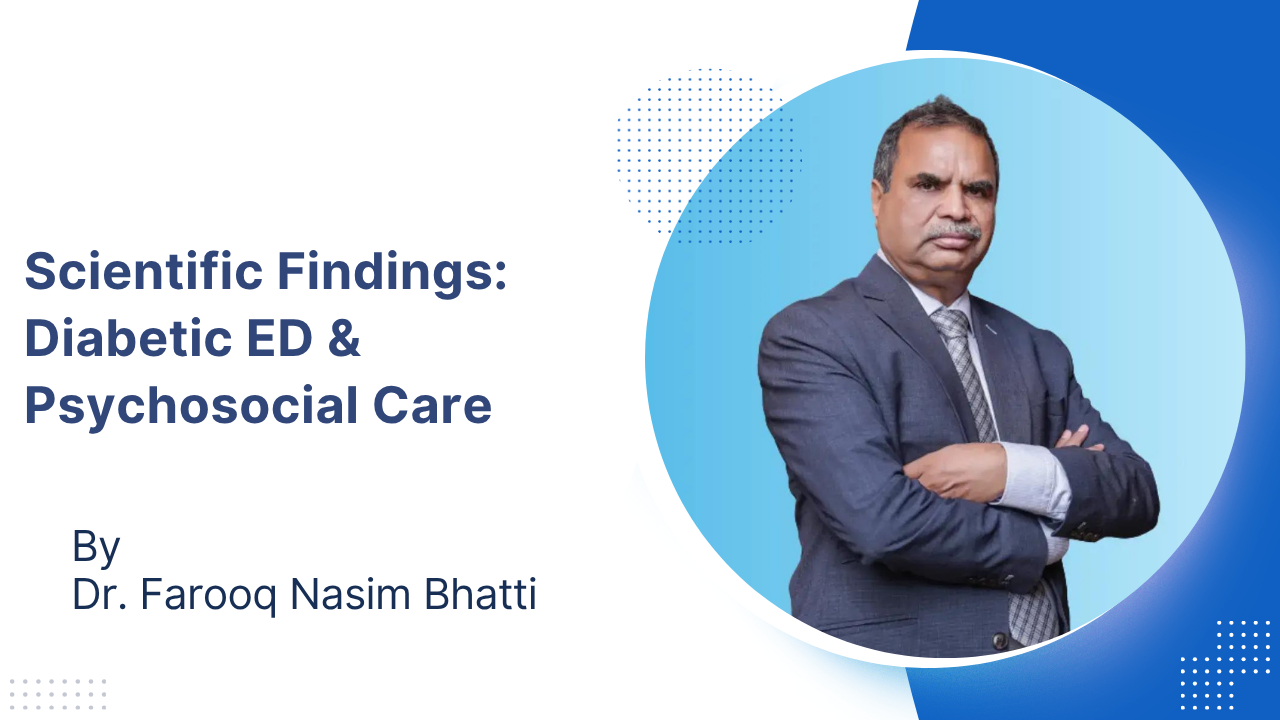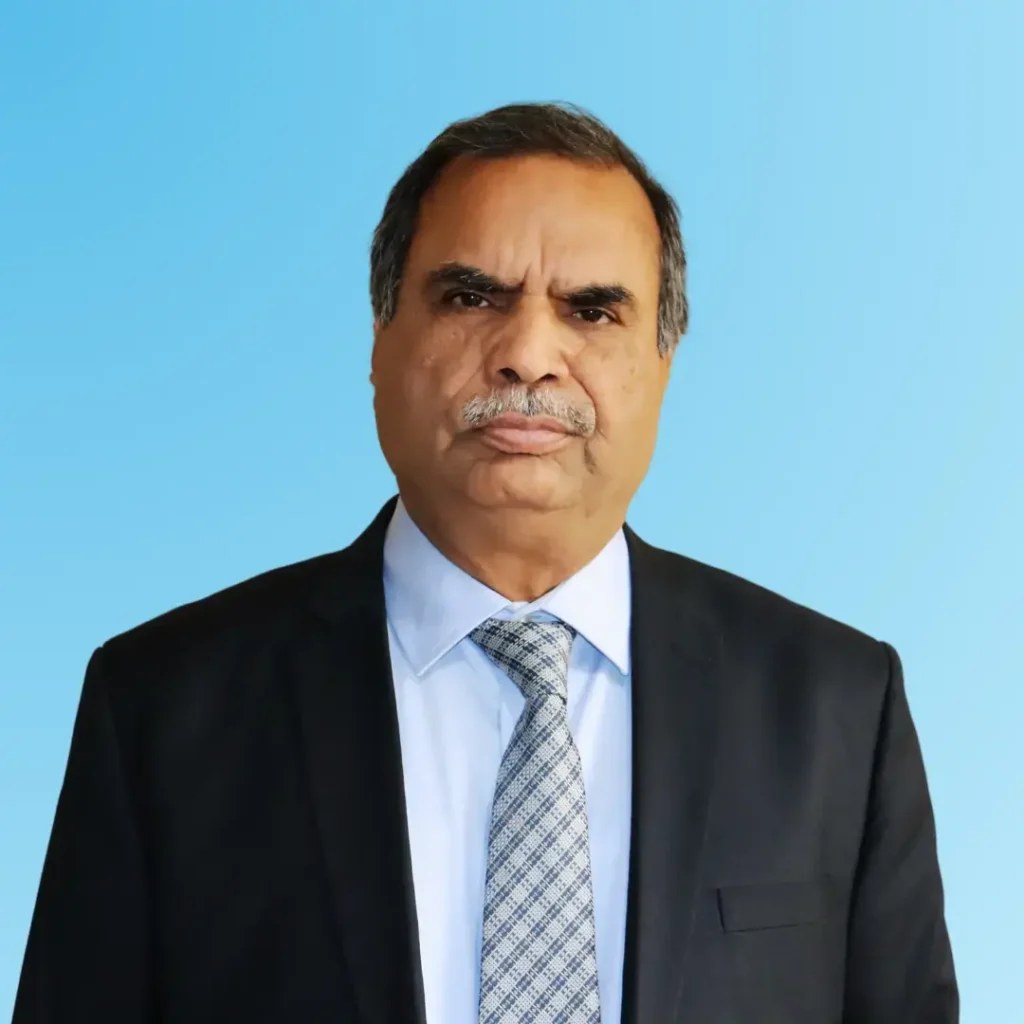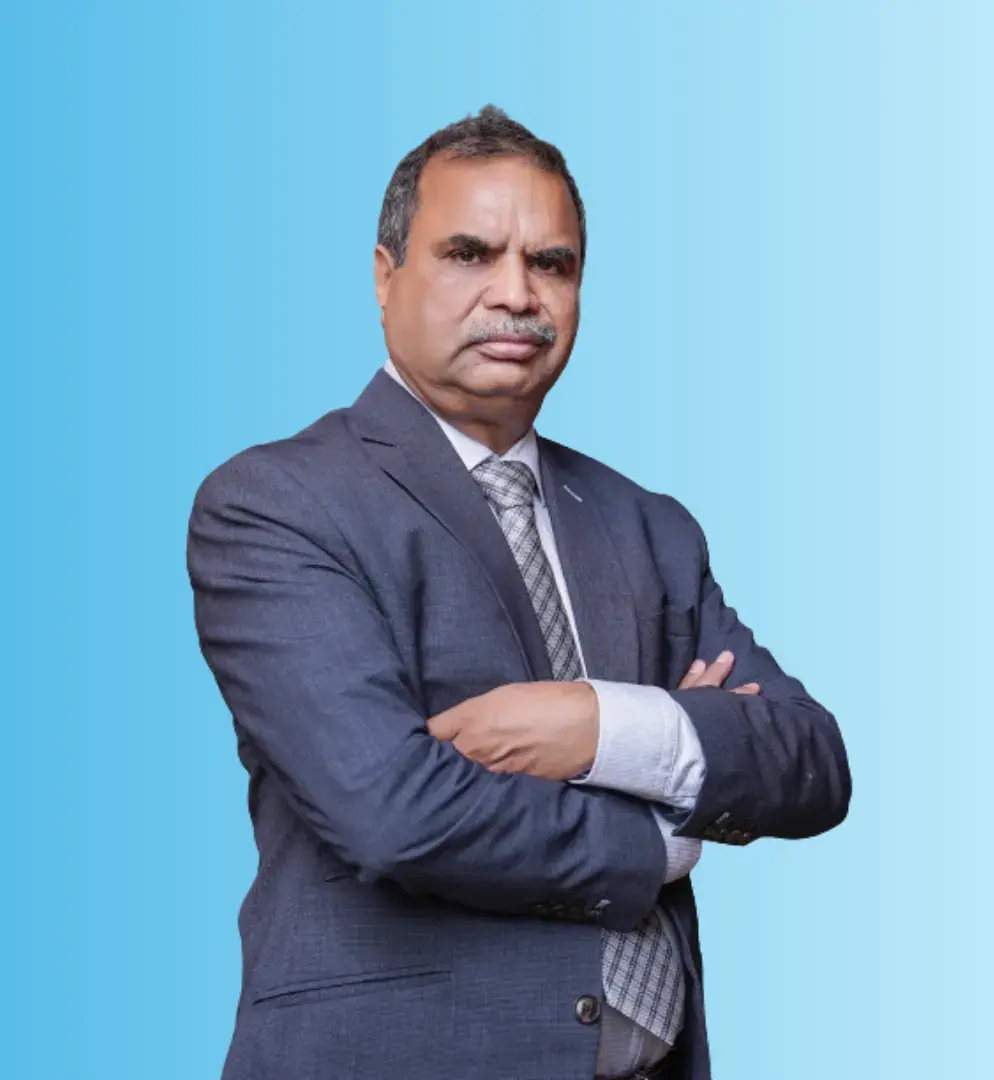
Erectile Dysfunction (ED) is a condition that millions of men around the world face, and its prevalence is particularly high among men living with diabetes. For many, the problem is considered purely physical, linked to poor circulation, nerve damage, or hormonal imbalances caused by diabetes. But as research on Psychosocial Treatment of Diabetic Erectile Dysfunction shows, not all cases of ED can be explained only by biological factors. The mind plays a critical role — and in countries like Pakistan, where social pressures around masculinity are intense, psychosocial factors can be just as damaging as physical ones.
At Nasim Fertility Center, under the leadership of Dr. Farooq Nasim Bhatti, one of Pakistan’s most qualified sexologists, new research has shed light on the importance of treating psychosocial contributors to diabetic ED. This work was presented at the 23rd Annual Fall Scientific Meeting of the Sexual Medicine Society of North America (SMSNA) and the International Society for Sexual Medicine (ISSM), bringing Pakistan’s sexual health research to the global stage.
Diabetes and Its Link to Erectile Dysfunction
Diabetes affects millions of people worldwide, and one of its lesser-discussed complications is erectile dysfunction. When blood sugar levels stay high for long periods, they damage the nerves and blood vessels. For men, this damage can directly affect the ability to achieve and maintain an erection.
But that’s only part of the story. Erectile function is not simply a mechanical process; it involves the brain, hormones, emotions, and the nervous system working together. For many diabetic men, even when medication is prescribed, the results may be limited if stress, anxiety, and psychological pressure are not addressed.
In Pakistan, this problem is made worse by stigma. The Urdu term often used for erectile dysfunction, “Namard” (meaning “he is not a man”), is heavy with judgment. Men who hear or internalize this term may feel ashamed or less masculine, which only deepens the emotional stress and creates a vicious cycle.
The Hidden Role of Psychosocial Factors
“Psychosocial” may sound like a medical term, but in reality, it simply means the way our mental and social lives affect our health. For erectile dysfunction, especially in men with diabetes, these factors can be just as important as physical ones.
Think about it this way: A man who is stressed, anxious, or worried about disappointing his partner may feel nervous every time he attempts intimacy. That nervousness itself can interfere with the ability to perform, which leads to further disappointment and stress. Over time, this loop of anxiety and failure becomes its own cause of erectile dysfunction.
Problems such as depression, low self-esteem, performance anxiety, and even relationship conflicts all feed into this cycle. Without addressing these emotional pressures, even the strongest medicines may not give the desired results.
What Research Tells Us
One of the most groundbreaking aspects of Dr. Farooq Nasim Bhatti’s work is his focus on the role of psychosocial factors in diabetic Erectile Dysfunction. Traditionally, ED in diabetic men has been viewed as a purely medical condition caused by vascular damage, neuropathy, or hormonal imbalance. However, this perspective overlooks the mental, emotional, and cultural dimensions that can aggravate the problem.
Dr. Bhatti and his team at Nasim Fertility Center designed a study to specifically investigate how addressing psychological and social pressures could improve sexual health outcomes for diabetic men. This research was carried out between September 2020 and January 2021, involving 74 male patients with diabetes who were struggling with varying degrees of Erectile Dysfunction.
The patients ranged in age from 24 to 62 years, with diabetes duration spanning 3 to 20 years. All participants underwent thorough clinical evaluation including:
Detailed medical and sexual history to understand not just physical but also psychological patterns.
Laboratory testing for HbA1c (to assess blood sugar control), testosterone, and prolactin levels, which often influence libido and erectile function.
Counseling sessions where patients could openly discuss their fears, anxieties, relationship stress, and cultural pressures linked to masculinity.
Treatment wasn’t limited to medication. Instead, the approach combined:
Sex therapy and structured counseling to reduce performance anxiety and reframe negative thoughts around masculinity.
Psychotropic medications where patients showed signs of anxiety, depression, or severe stress.
Lifestyle modification such as diet changes, improved physical activity, and better glycemic control.
Medical therapy (PDE-5 inhibitors) prescribed only as needed, with careful dose management.
Adjunct therapies including testosterone when medically indicated, and options like injections or vacuum devices for more resistant cases.
The patients were grouped based on the severity of their symptoms:
Group A – Loss of erection and short erection duration
Group B – Decreasing effectiveness of PDE-5 inhibitors
Group C – PDE-5 inhibitors completely ineffective
By categorizing patients in this way, the study could track how much improvement came from psychosocial interventions alone and when medications or advanced treatments were necessary.
The significance of this research lies in its ability to quantify the impact of non-medical interventions on diabetic ED. It demonstrated that even when physical damage from diabetes existed, addressing the patient’s mental state, relationship concerns, and lifestyle could often restore erectile function naturally.
Key Findings: How Psychosocial Care Changed Outcomes
The results of Dr. Farooq Nasim Bhatti’s study were not only statistically significant — they were life-changing for many patients. By combining medical management with psychosocial therapy, men who had struggled for years with diabetic ED found new hope.
Group A – Men with weaker erections and shorter duration
This group included 36 men who reported that their erections either did not last long enough or were not strong enough for satisfactory intimacy.
Traditionally, these men would have been placed on PDE-5 inhibitors (such as sildenafil) as a first line of treatment. But Dr. Bhatti’s approach started with sex therapy, counseling, and lifestyle interventions. The results were remarkable:
30 out of 36 patients (83%) regained normal sexual function naturally.
They did not need long-term reliance on medications.
Only 6 patients (17%) required continued support with PDE-5 inhibitors.
This means that for most men, simply addressing psychological fears, anxiety, and relationship stress — combined with blood sugar control and counseling — was enough to restore natural function.
What it shows: For men with mild-to-moderate ED linked to diabetes, psychosocial therapy can often eliminate the need for lifelong medication.
Group B – Men whose medications were becoming less effective
This group had 16 men who were already using PDE-5 inhibitors but noticed that the drugs were no longer working as well as before. This is a common frustration among diabetic patients: they start with good results, but over time, the medication loses effectiveness, leading to hopelessness and marital strain.
With Dr. Bhatti’s program:
11 men (69%) regained natural sexual function without needing to increase drug doses.
5 men (31%) still needed PDE-5 inhibitors, but at much lower doses than before.
This outcome is particularly significant. Instead of patients increasing their medication indefinitely — which can be costly, stressful, and discouraging — counseling and therapy allowed many to reverse dependence on drugs and reclaim control of their own sexual health.
What it shows: Even when medications seem to stop working, psychosocial care can restore responsiveness and reduce reliance on pills.
Group C – Men for whom medication no longer worked at all
This was the most challenging group: 22 men whose PDE-5 inhibitors had become completely ineffective. Many of these men felt they had reached a “dead end” in their treatment.
Yet the study showed encouraging results:
12 patients (55%) regained natural function through counseling, sex therapy, and lifestyle change.
6 patients (27%) were able to benefit again from PDE-5 inhibitors, though at smaller, more effective doses.
Only 4 patients (18%) required advanced interventions such as injections or vacuum devices.
For men who had completely lost faith in medical treatment, this outcome was nothing short of transformational. More than half recovered without invasive procedures, and a significant portion regained responsiveness to oral medication.
What it shows: Even in severe cases, psychosocial treatment can “unlock” progress where medication alone fails.
Putting the Numbers into Perspective
When viewed as a whole, the study illustrates a critical truth: psychological and social factors can be as powerful as medication in treating diabetic ED.
Across all groups, a large majority of men experienced significant improvement in natural function without needing heavy reliance on drugs.
Even those who continued to use medication often required lower doses after therapy, reducing side effects and costs.
Only a small minority needed invasive treatments — proof that a holistic approach can reduce the need for advanced interventions.
These results also underscore the importance of early intervention. Men in Group A (mild ED) responded the best, which shows that seeking help sooner rather than later gives patients a much higher chance of natural recovery.
Why Psychosocial Care Matters in Pakistan
In Pakistani society, conversations around sexual health remain taboo. Men often delay seeking help until the problem becomes severe, and many feel ashamed to even discuss ED with their spouse or doctor. The result is unnecessary suffering, marital strain, and in some cases, infertility.
By offering a private, confidential, and non-judgmental environment, Nasim Fertility Center is helping break this cycle. Counseling not only reduces performance anxiety but also addresses deep-rooted fears linked to cultural stigma. For couples, relationship therapy can restore intimacy and improve marital harmony, proving that treating ED goes beyond just medical prescriptions.
Treatment Options at Nasim Fertility Center
Dr. Farooq Nasim Bhatti and his team provide a comprehensive range of services for men facing ED, especially those with diabetes. Treatment may include:
Sex therapy and counseling to reduce anxiety and stress.
Medical management, including PDE-5 inhibitors, hormonal therapy, or advanced options when required.
Lifestyle and dietary guidance to improve overall health and blood sugar control.
Advanced interventions such as IUI (Intrauterine Insemination) for couples facing infertility due to male factor issues.
Each treatment plan is tailored to the patient’s medical background and psychological needs, ensuring care that is effective, safe, and confidential.
Global Recognition of Dr. Farooq Nasim Bhatti’s Work
This research was officially presented at the 23rd Annual Fall Scientific Meeting of SMSNA–ISSM (Sexual Medicine Society of North America & International Society for Sexual Medicine). By contributing Pakistani clinical data to an international platform, Dr. Bhatti has positioned himself and his clinic as leaders in the global conversation on sexual health and diabetic ED.
The study reinforces the fact that psychosocial factors cannot be ignored in treating sexual dysfunction, particularly in countries with strong cultural taboos around sexual health.
Conclusion
Erectile Dysfunction in diabetic patients is not only a biological issue but also a psychosocial one. Dr. Farooq Nasim Bhatti’s research shows that with the right mix of counseling, lifestyle support, and selective medical treatment, a majority of men can regain natural sexual function — even when traditional medications like PDE-5 inhibitors fail.
For patients in Pakistan, this means there is hope beyond medication. With discreet, professional care, ED can be treated, relationships can be restored, and confidence can return.
If you are struggling with diabetes and sexual health concerns, don’t suffer in silence. Contact Nasim Fertility Center today for a confidential consultation with Dr. Farooq Nasim Bhatti. With clinics in Lahore, Islamabad, and Faisalabad, as well as online consultation options, help is closer than you think.
Disclaimer
This information is for educational purposes and not the treatment. For treatment, you need to consult the doctor.

Dr. Farooq Nasim Bhatti (MBBS, FAACS – USA, Diplomate: American Board of Sexology, CST, HSC – Hong Kong, CART – Malaysia & China) is a qualified medical sexologist with 30+ years of experience. He has presented 21+ research papers internationally and treats sexual dysfunction through sex therapy, counseling, and pharmacotherapy to restore natural sexual function without temporary medication.

Regain Confidence with Our ED Solutions
Explore effective treatments for erectile dysfunction. Take charge of your intimacy today.


